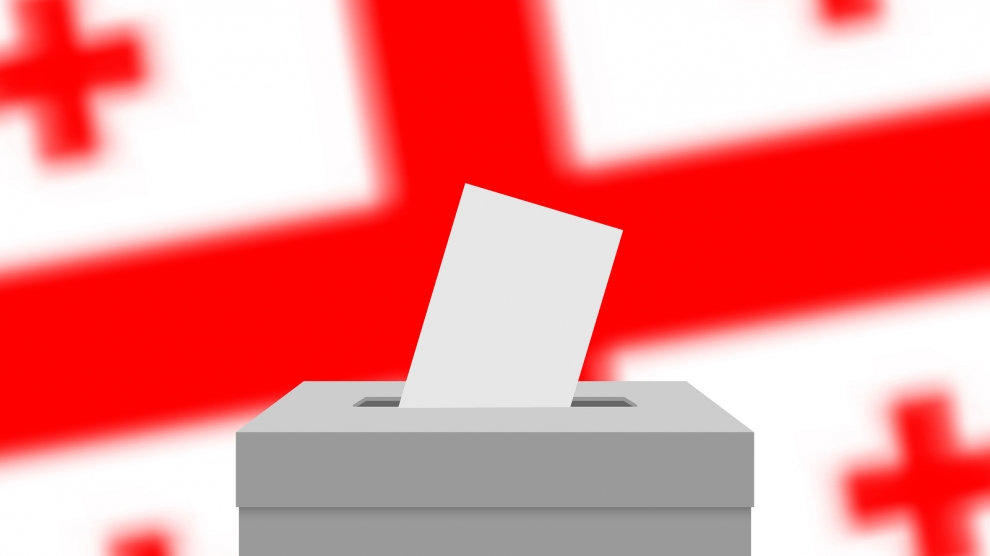Georgia’s ruling party, Georgian Dream, has reached a long-awaited agreement with the country’s opposition to change the country’s electoral system ahead of parliamentary elections in October.
Following months of negotiations mediated by EU and US diplomats, the agreement means that 120 seats in Georgia’s next parliament will be elected according to a system of proportional representation, while the remaining 30 MPs will be directly elected from constituencies.
The agreement also sets the electoral threshold at one per cent of the proportional vote, and creates a capping mechanism whereby no single party taking less than 40 per cent of the vote will be able to hold a majority of seats.
“The 30 electoral constituencies will be drawn up in compliance with the relevant ruling of the Georgian Constitutional Court and the recommendations of the Venice Commission,” the agreement reads, adding that “further caps and provisions will be introduced in the legislation with the am of facilitating a more proportional distribution of mandates relative to the votes received by the parties.”
Commenting on the deal, Georgia’s prime minister Giorgi Gakharia said that the agreement was an important step towards strengthening the country’s democracy, with President Salome Zurabishvili calling it “a victory for the public.”
The opposition appeared to agree.
“This is a good result for a country that had been going through a crisis,” said Giga Bokeria, one of the leaders of the opposition European Georgia party.
The compromise comes after the Georgian Dream-led government – due to political tensions within the party – backtracked late last year on promises to introduce a proportional election system for the 2020 parliamentary elections despite constitutional amendments from 2017 that paved the way for a fully proportional electoral contest from 2024.
Under the current system, 77 of the 150 Georgian MPs are elected via proportional representation, with the remaining 73 elected through single-mandate electoral districts.
Georgia’s international partners, which were instrumental in mediating the talks, have welcomed the agreement.
“[The agreement] is an important and visible signal of political leadership from all sides which reflects a desire to decrease the unhealthy political polarisation in Georgia,” said Peter Stano, the lead spokesperson of the EU’s European External Action Service (EEAS), noting that the Georgian parties should also address recommendations made by the OSCE to ensure the highest level of confidence from the electorate and the international community.
US Congressman Adam Kinzinger, the Republican co-chair of the US House Georgia caucus, who has previously criticised Georgia’s ruling party for backtracking on its democratic promises, also hailed the agreement.
“Democracy is not easy – it’s hard work, but it is undoubtedly worth it. I want to congratulate the Georgian people on achieving the pro-democracy reforms they’ve long fought to achieve. It has been a long road to this agreement, but through compromise and maturity, the necessary steps to secure democracy has finally been reached,” he said in a statement.
Not everyone has been quite so positive, however.
Ghia Abashidze, a Georgian political analyst based in Tbilisi, says that the constitutional changes required to implement the new system will require three votes in parliament that will need to be carried with a minimum of 113 votes.
“Are all the Georgian Dream MPs convinced that they should adopt the latest changes? It remains to be seen,” he tells Emerging Europe. “Georgian politics is a roller-coaster. The trend will not change in the upcoming months.”
The multi-party compromise also fails to address a situation surrounding four opposition figures, including Gigi Ugulava, the head of the European Georgian party, who was sentenced to three years in prison in February for the embezzlement of 48 million Georgian lari (around 15 million euros) while serving as mayor of Tbilisi.
“[These] people are political prisoners, something which is denied by the ruling party. However, in yesterday’s joint document we agreed that the issue should be settled in a way that none of political parties have the feeling that justice is being used to achieve political goals,” the Georgian opposition said in a joint statement, asking President Zurabishvili to pardon Mr Gugulava and the three others.
The president has so far refused to say if she would pardon the head of European Georgia, however, although she has said that she would process the request.

